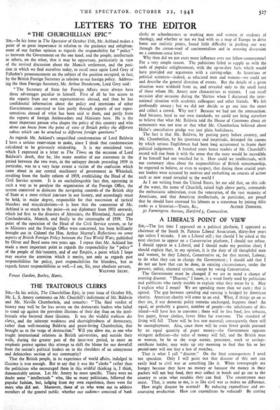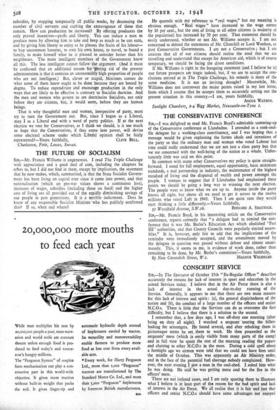A LIBERAL'S POINT OF VIEW
SIR,—The last time I appeared on a political platform' I appeared as chairman of the South St. Pancras Liberal Association, thirty-five years ago unless I mistake. I am a Liberal still ; but should I be asked at the next election to appear on a Conservative platform, I should not refuse. I should appear as a Liberal, and I should make my position clear; I should explain that, in my opinion, it is the duty of all- thoughtful men and women, be they Liberal, Conservative or, for that matter, Labour, to do what they can to change the Government ; I should add that I do not see how that can be done, in existing circumstances, under the present, unfair, electoral system, except by voting Conservative.
The Government must be changed if we are to stand a chance of averting disaster. "Disaster," I know, is a word freely used by politicians and publicists who rarely trouble to explain what they mean by it. May I explain what I mean? We are spending more than we earn ; that is agreed. The gap between spending and earning is bridged by American charity. American charity will come to an end. What, if things go on as they are, if our domestic policy remains unchanged, happens then? An equal, or probably a greater, number of people—the inhabitants of this island—will have less to consume ; there will be less food, less tobacco, less paper, fewer clothes, fewer films for everyone. The standard of living will fall. There will be less raw material; consequently there will be unemployment. Also, since there will be even fewer goods pursued by an equal quantity of paper money—the Government opposes stringent deflation—the value of money will fall, and the British man or woman, be he or she wage earner, pensioner, stock or savings- certificate holder, may wake up any morning to find that his or her pound-note will not buy a box of matches.
That is what I call " disaster." On the final consequences I need not speculate. Only I will point out that disaster of this sort can easily lead to civil war or something like it. When townspeople are hungry because they have no money or because the money in their pockets will not buy food, they may collect in bands and go out to the country to seize what eatables they can find. The countrymen may resist. That, it seems to me, is as like civil war as makes no difference. How might disaster be averted? By reducing expenditure and en- couraging production. How can expenditure be reduced? By cutting
subsidies, by stopping temporarily all public works, by decreasing the number of civil servants and curbing the extravagance of those that remain. How can production be increased? By offering producers the only proved incentives—profit and liberty. You can induce a man to produce more by allowing him to take and keep as much as he can earn, and by giving him liberty to enjoy as he pleases the fruits of his labour— to buy uncommon luxuries, to own his own house, to travel, to found a family, to make himself what he is pleased to consider better than his neighbours. The more intelligent members of the Government know all this. The less intelligent cannot follow the argument. (And it must be confessed that an additional reason for "getting rid of the present administration is that it contains an unreasonably high proportion of people who are not intelligent.) But, clever or stupid, Ministers cannot do what some of them know ought to be done because they are bound by dogma. To reduce expenditure and encourage production in the only ways that are likely to be effective is contrary to Socialist doctrine. And the men and women who govern us are doctrinaire Socialists, not only before they are citizens, but, it would seem, before they are human beings.
That is. why thoughtful men and women, irrespective of party, must try to turn the Government out. But, since I began as a Liberal, may I as a Liberal end with a word of party politics. If at the next election we vote for Conservatives, as I think we should, is it too much to hope that the Conservatives, if they come into power, will devise some electoral scheme under which Libeial opinion shall be fairly
represented?—Yours faithfully, CLIVE BELL. 'Charleston, Firle, Lewes, Sussex.



































 Previous page
Previous page